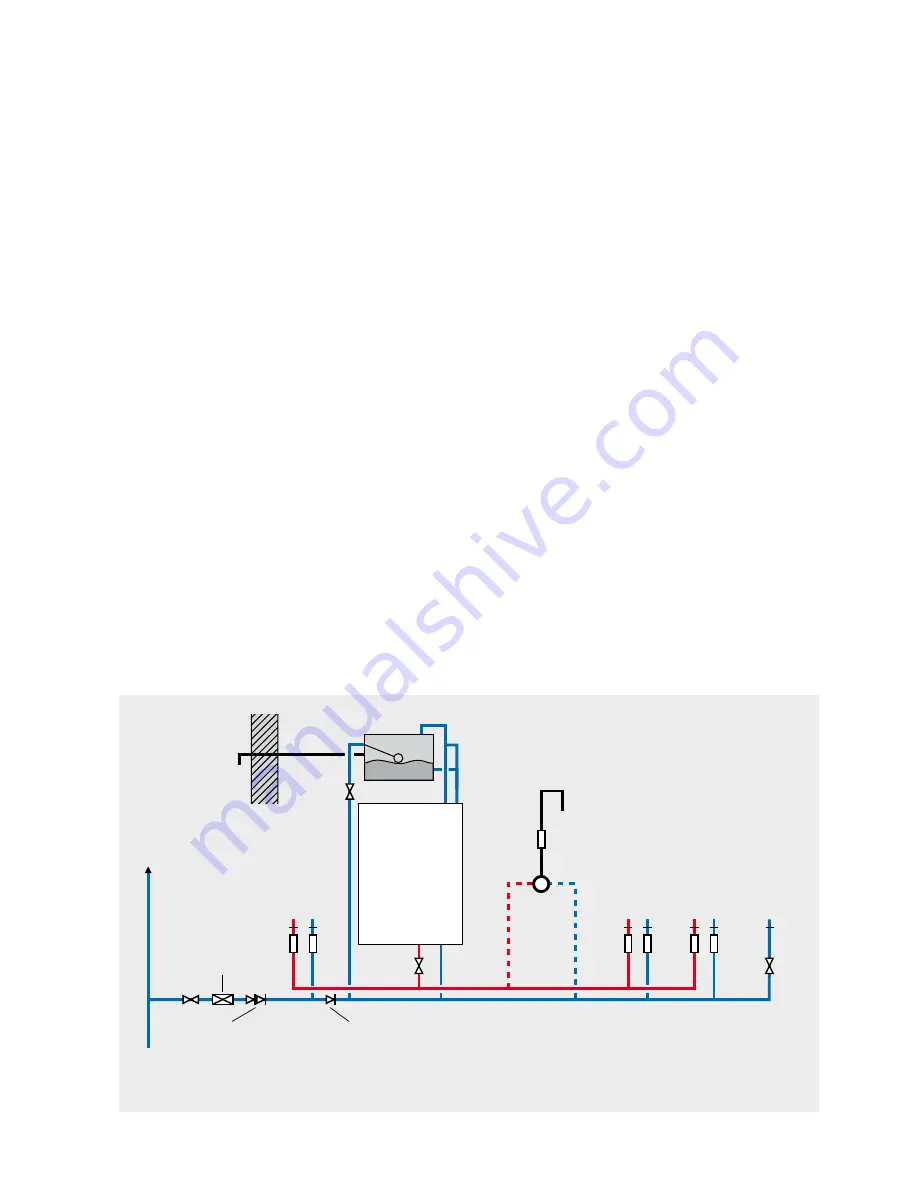
Page 9
Hot and Cold Water System
General
A schematic layout of the hot and cold water services in a typical small dwelling is
shown below. PulsaCoil Stainless will operate at mains pressures as low as 1 bar
and as high as 5 bar although the recommended range is 2-3 bar dynamic at the
appliance. It is also important to check that all other equipment and components in
the hot and cold water system are capable of accepting the mains pressure available
to the property. If the mains pressure can rise above 5 bar or the maximum working
pressure of any item of equipment or component to be fitted in the system, a pressure
limiting (reducing) valve set to 3 bar will be required.
If you encounter a situation where the water pressure is adequate but flow rates are
poor please contact our technical helpline for details of an effective solution.
Note
: Each Pulsacoil Stainless is fitted with a strainer and flow regulator on the cold
mains supply connection. If the supply pressure is less than 2 bar or if all taps are
provided with flow regulators the flow regulator on the cold inlet should be removed.
No check valve or similar device should be fitted on the cold water supply branch to
the PulsaCoil Stainless.
The Building Regulations L1A: New dwellings/L1B: Existing dwellings and the
requirements set out in the Domestic Heating Compliance Guide specify that “where
the mains water hardness exceeds 200ppm provision should be made to treat the feed
water to water heaters and the hot water circuit of combination boilers to reduce the
rate of accumulation of lime scale”.
To comply with this requirement the hardness of the mains water should be checked
by the installer and if necessary the optional factory fitted in-line scale inhibitor should
be specified at the time of order for hardness levels between 200 and 300 ppm (mg/l).
Warning/
overflow
pipe
MCWS
Safety/open vent
Shower
Expansion/
cold feed
Second
dwelling
Pressure limiting valve
NOT REQUIRED at
pressures below 5 bar
unless any components
have a lower
maximum working
pressure
Double check valve
NOT REQUIRED unless
pipe supplies more
than one dwelling
‘a’ - flow regulator recommended for
better balance of hot and cold
water supplies
MCWS
supply
pipe
Sink
H C
a a
SV
a a
a a
Bath
H C
Hand basin
H C
WC - fitted
with BS1212
ballvalve
C
Figure 1.5
Typical hot and cold water distribution
PULSACOIL
STAINLESS
Check valve
NOT REQUIRED unless
chemical water
treatment unit is fitted
a
Top up cistern
DESIGN
TECHNICAL DATA
Where the water is very hard ie 300ppm (mg/l)
and above the optional polyphosphate type,
inhibitor should be specified at the time of
order. However, this will need to be fitted by
the installer at a suitable point in the cold water
supply to the appliance.
The hot water flow rate from the PulsaCoil
Stainless is directly related to the adequacy
of the cold water supply to the dwelling.
This must be capable of providing for those
services, which could be required to be supplied
simultaneously, and this maximum demand
should be calculated using procedures defined
in BS EN 806:1-5: BS EN 8558:2011.
If a water meter is fitted in the service pipe,
it should have a nominal rating to match the
maximum hot and cold water peak demands
calculated in accordance with BS EN 806:1-5:
BS EN 8558:2011. This could be up to 60ltr/min
in some properties.
Note:
The diagram below shows the top up
cistern with ballvalve and warning/overflow
pipe which can be supplied as an optional extra
if required. However, the standard preferred
arrangement is for the cistern to be manually
filled from a temporary hose connection fitted
with a double check valve.
The cistern must not be fitted more than 10
metres above the PulsaCoil Stainless appliance
itself.
Summary of Contents for PulsaCoil PCS 120
Page 25: ...Page 25 APPENDIX APPENDIX B ...
Page 27: ...Page 27 NOTES NOTES ...










































